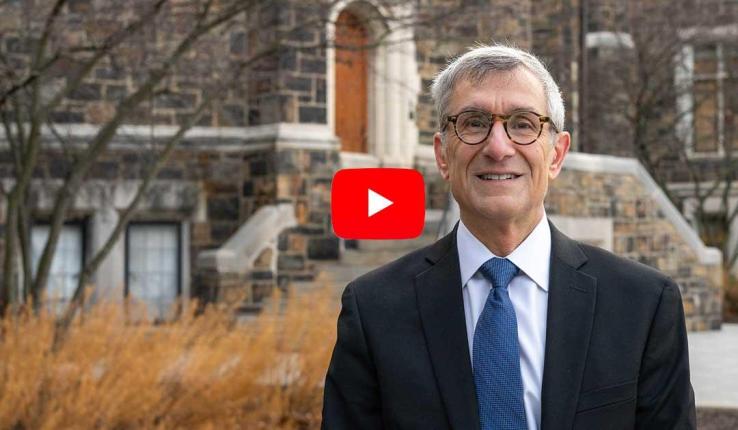Fathima Wakeel, currently an associate professor of public health at Ferris State University, will join the faculty of Lehigh’s College of Health in January. As a founding faculty member of Ferris State’s public health program, Wakeel helped build the program from the ground up, developing curricula, forming community partnerships and recruiting students. She will do the same at Lehigh as an inaugural faculty member in the College of Health.
“I'm really thrilled to be a part of the Lehigh team…[and] to work with our colleagues and our community to build this College of Health from scratch,” Wakeel says. “It’s bringing together people from around the country who are experts in their fields, as well as new students and community partners, to build a program that's going to be very impactful in the local community and then regionally, nationally and globally.”
“I am thrilled to welcome Dr. Fathima Wakeel to the faculty of the College of Health,” says Whitney Witt, inaugural dean of the College of Health. “As a scholar, Dr. Wakeel comes to us with a robust program of research aimed at reducing racial and ethnic disparities in maternal and child health outcomes. In particular, she has been a leader in the development of measures of resilience and personal capital among pregnant women. She also has substantial experience in developing undergraduate curricula and programs that will be instrumental in launching our initial educational offerings. Dr. Wakeel is a wonderful addition to the growing faculty of the College and I am very excited for her to join us in January.”
At Ferris State, Wakeel serves as coordinator of the bachelor of science in public health program in the university’s College of Health Professions. Over the past several years, she has developed and taught three undergraduate and two graduate courses for the public health programs. She has been, she says, the “face of the undergraduate program,” understanding the needs and interests of undergraduate students, speaking to high school students about public health, and connecting to the community through events and outreach.
Wakeel’s recent work at Ferris State includes the development of the Rural Opioid Prevention Network. The project is funded by a Health Resources and Services Administration (HRSA) one-year planning grant.
“[The goal] is to plan for the development of opioid misuse prevention resources in Mecosta County, Michigan, which is the county that we reside in,” Wakeel explains. “We really focused on prevention because with my population health background, I knew we'd have more bang for the buck that way. I felt like if we could increase access to and availability of mental health care services, provide more education among key sectors of the community—such as schools, law enforcement and worksites—to reduce stigma related to mental health and substance misuse issues, create more links between primary care and mental health care, and develop other such preventative initiatives, we could potentially deter a lot of other risky health behaviors down the line, like other types of substance misuse.”
Wakeel hopes to conduct similarly impactful work at Lehigh.
“I enjoy collaborating with a team... I was really excited about the prospect [of the College of Health] because when you build something new, you have the valuable opportunity to contribute to your discipline in the way you would like,” she says. “And when you have a good understanding of evidence-based recommendations as well as how things work or don’t work in practice, at least from your experience, it's a gift to be able to start fresh.”
Developing community partnerships, she says, will be a priority in her work at Lehigh, for both experiential learning opportunities for students and services that will benefit the community: “It's a dynamic relationship because [the community] helps us and then we help them through internships to tackle community projects...I know through their observations and reflections that my students have really enjoyed interfacing with the community through community-based forums, internships and volunteer work. I feel like they learn so much more from them than they ever will in the classroom.”
Those partnerships, Wakeel says, also tie into her research, which focuses on racial, ethnic and socioeconomic disparities in maternal and child health, as well as women’s mental health. She hopes to conduct community-based participatory research, in particular.
“I would really like to return to my roots of maternal and child health, which I haven't been able to explore as much in the past few years due to my teaching responsibilities and program development at Ferris State, which is a teaching-intensive institution,” Wakeel says. “I aim to continue examining and measuring the protective factors that women and families can garner to have healthy outcomes over the life course, specifically healthy pregnancy and obstetric outcomes. My vision would be to closely collaborate with students to conduct this community-based, mixed-methods [both qualitative and quantitative] research.”
The local community will also play an important role in her teaching, she says.
“When building our curriculum, it's vital to incorporate the community, whether it's a guest lecture or experiential learning opportunities in the classroom, to ensure that students have that tie-in with the community and that when they enter the job market, they have a deeper understanding of how to translate abstract concepts learned in the classroom into practice,” she explains.
Wakeel received her Ph.D. in public health from UCLA, with a dissertation focused on maternal resiliency. She completed two postdoctoral fellowships at the University of Wisconsin-Madison, where she was mentored by Dean Witt: one at the School of Medicine and Public Health and one with the Center for Women’s Health and Health Disparities Research.





